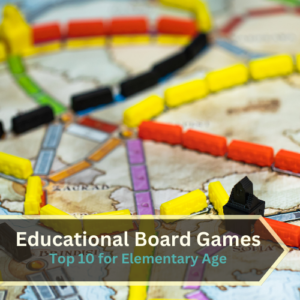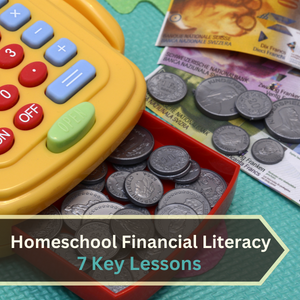Welcome to a world where learning and play intersect seamlessly. At Happy Pages Homeschool, I’ve embarked on a quest to find the top educational board games that resonate with young, inquisitive minds. Through rigorous testing and delightful gameplay, I discovered that Ticket to Ride is a frontrunner, combining education and entertainment in a way that captivates and educates in equal measure.
Best Overall: Ticket to Ride
Ticket to Ride stands out because it’s more than just a game. It’s a journey through geography, a sneak peek into history, and a fun way to incorporate math. Your children won’t just play; they’ll plan, they’ll strategize, and without even realizing it, they’ll learn. The cross-curricular benefits are immense, tapping into skills that traditional textbooks simply can’t match.
But one size doesn’t fit all in the realm of learning. Each child is unique, and each game on our carefully curated list caters to different strengths and interests. Some games are strategy champions, others are word wizards, and some are detectives of deduction. We’ll explore which educational board games align best with your child’s educational journey and innate curiosity.
Embark with me as we navigate the top educational board games catering to various learning objectives. Discover which of these treasures aligns with your child’s educational goals and interests.
Product Mini-Reviews: Educational Board Games
Product 1 – Best Overall: Ticket to Ride
Ticket to Ride is a standout in the world of educational board games for several compelling reasons. Its multifaceted nature makes it a favorite among children and endears it to educators and parents alike.
Engages Multiple Learning Facets in Educational board games
Ticket to Ride engages children in a comprehensive learning experience. It’s a game of strategic rail adventures that cleverly integrates geography, history, and mathematics into its gameplay.
- Geography: As players collect cards and claim railway routes across a map of North America, they get acquainted with different cities and how they’re interconnected, boosting their geographical knowledge organically.
- History: The game is set in the early 20th century, a historical period rich with industrial growth and the golden age of railroads. This setting provides a backdrop for discussions about historical events and the development of transportation.
- Mathematics: Children are often unaware that they are practicing math while playing. They calculate the longest continuous routes, manage limited resources (train cars and cards), and optimize route choices to maximize points, engaging in complex arithmetic and problem-solving.
Educational Board games promote Critical Skills Development
Ticket to Ride is more than an educational tool; it’s a catalyst for developing critical thinking and social skills.
- Strategic Planning: Players must plan their routes in advance and anticipate their opponent’s moves, which requires foresight and strategy.
- Decision Making: With every turn, players make decisions about which routes to take and which train cards to draw, fostering decision-making skills.
- Problem-Solving: Players often have to find alternative paths to their destinations when competitors block routes, which requires quick thinking and adaptability.
Family Engagement
One of the game’s greatest strengths is its ability to bring families together. It’s simple enough for children to understand yet complex enough to keep adults engaged, making it an excellent game for family bonding.
- Cooperative Play: While the game has a competitive element, it also encourages cooperation. Families can discuss strategies and negotiate routes, fostering a collaborative environment.
- Communication: Ticket to Ride requires players to communicate their actions and plans, enhancing verbal communication skills.
Adaptable Difficulty
The game is scalable in difficulty, which means it can be adapted to suit the player’s age and skill level. The rules can be simplified for younger children or beginners, and as players become more advanced, additional rules and layers of strategy can be introduced.
- Extensions and Variants: There are numerous expansions available that introduce new maps and rules, providing fresh challenges and learning opportunities.
- Replay Value: The game’s design ensures that no two games are the same, which keeps children engaged and continually learning.
Educational Value Beyond the Game
Ticket to Ride can be a jumping-off point for deeper educational explorations. It sparks curiosity about the places on the map, leading to side research and learning opportunities.
- Integrated Learning: The game can be part of a larger lesson plan, incorporating research on different cities, historical train routes, and the impact of the railroad on the development of countries.
- Cultural Exploration: Players might explore the cultural significance of each city on the map, understanding the diversity and history of the continent.
Product 2 – Best for Strategy: Catan: Family Edition
Catan: Family Edition simplifies the iconic educational board game of commerce and development, making it accessible for younger players. It introduces complex concepts like resource management and economic principles in a digestible format. As players trade and build their way to victory, they learn the value of strategic planning and the art of negotiation, skills that are vital both in and out of the classroom.
- Strategic Thinking: Players must manage resources and plan settlements wisely.
- Negotiation Skills: Interaction with other players through trading is key to success.
- Problem-Solving: Each game is a new puzzle to solve, making it perfect for young minds developing their strategic skills.
Product 3 – Best for Deductive Reasoning: Outfoxed
Outfoxed is a cooperative whodunit game where players work together to gather clues and deduce which fox stole the pot pie. It teaches logical thinking and teamwork as children learn to make collective decisions based on information gathered. This game is a thrilling introduction to deductive reasoning, a cornerstone of scientific thinking and problem-solving.
- Foster Teamwork: It requires players to collaborate and make decisions as a group.
- Develop Logic: The game enhances deductive reasoning as players gather clues to uncover the guilty fox.
- Enhance Critical Thinking: It challenges players to think critically about the clues they collect and the deductions they make.
Product 4 – Best for Geography and Nature: Trekking the National Parks
Trekking the National Parks brings the beauty of America’s natural landscapes into your home. Players journey through various parks, collecting stones and claiming park cards, learning about geography and nature conservation along the way. It’s a game that encourages exploration and appreciation of the natural world, offering a myriad of teachable moments about the environment.
- Geography Knowledge: Players learn about the locations and features of national parks.
- Nature Trivia: The game is packed with educational facts about the flora and fauna found in the parks.
- Family Bonding: It encourages family discussions about nature and conservation.
Product 5 – Best for Early Reading: Zingo
Zingo is a fast-paced matching game that reinforces language skills and can be a boon for early readers. As children match pictures and words on their challenge cards, they quickly build a vocabulary and improve their recognition of sight words. This game sparks joy and excitement around reading, setting a foundation for a lifelong love of books and learning.
- Vocabulary Building: It’s fantastic for early readers, enriching their vocabulary.
- Reading Skills: The game’s quick nature encourages rapid word recognition.
- Interactive Fun: Its energetic pace keeps young learners engaged and excited.
Product 6 – Best for Creativity and Storytelling: Dungeons and Dragons: Adventure Begins
Dungeons and Dragons: Adventure Begins opens the door to a world of fantasy where imagination shapes reality. Players collaborate to tell a story, choosing paths and battling foes while developing their storytelling and creative problem-solving abilities. It’s a game that champions creativity and narrative skills crucial for personal and academic growth.
- Storytelling Prowess: Players craft their own narratives, enhancing creative thinking.
- Cooperative Gameplay: The game emphasizes working together to overcome challenges.
- Imaginative Play: It promotes the use of imagination, which is crucial for cognitive development.
Product 7 – Best for Physical Activity: The Floor is Lava
The Floor is Lava transforms your home into an imaginative volcanic landscape where players must avoid touching the ground. It encourages physical activity, agility, and spatial awareness. This game is an excellent way for children to practice gross motor skills while engaging in healthy, active play.
- Kinesthetic Learning: Encourages children to learn through movement and play.
- Balance and Coordination: The game promotes physical dexterity and awareness.
- Interactive Fun: It gets kids jumping, stretching, and laughing, all while learning.
Product 8 – Best for Young Detectives: Clue Junior
Clue Junior is the perfect introduction to the world of mystery and investigation. It simplifies the classic game of Clue, making it suitable for younger players to develop reasoning and inference skills. As they navigate the board to solve the mystery, they practice critical thinking and learn the value of deductive logic.
- Reasoning Skills: It teaches children to deduce information from given clues.
- Memory Development: Players must remember the suspects, tools, and locations.
- Observational Skills: Kids learn to pay attention to details, a key skill in learning.
Product 9 – Best for Cultural Awareness: I Never Forget a Face
I Never Forget a Face is a memory-matching game featuring children’s faces from around the world. It celebrates diversity and promotes cultural awareness, all while strengthening memory and concentration. This game is a gentle way to introduce children to the wider world and the many faces that shape it.
- Learn Diversity: The game features faces from around the world, teaching global awareness.
- Improve Memory: It’s a classic memory game that helps with cognitive development.
- Cultural Exploration: Encourages discussions about different cultures and traditions.
Product 10 – Best for Building and Logic: Castle Logix
Castle Logix is a puzzle game that challenges young builders to construct castles based on various blueprints. It’s an excellent tool for developing spatial reasoning and logic skills. As children manipulate the blocks to match the images, they also fine-tune their motor skills and learn the basics of architectural design.
- Spatial Reasoning: Kids learn about geometry and spatial relationships.
- Logic Skills: It challenges players to think logically to solve the puzzles.
- Fine Motor Skills: Handling the pieces helps in developing hand-eye coordination.
Buying Guide
When selecting educational board games, consider the following:
- Age Appropriateness: Ensure the content is suitable for your child’s age and abilities.
- Educational Outcomes: Look for games that align with your educational goals and curriculum.
- Engagement Level: A game should be fun to keep children interested and eager to play.
- Child’s Interests: Games should resonate with your child’s passions to facilitate deeper learning.
- Learning vs. Playtime: Find a balance between educational content and playability to maintain enthusiasm.
- Durability: High-quality components that withstand the test of time and frequent use are key.
Reflections
Educational board games like Ticket to Ride shine brightly in the landscape of educational tools. They offer a world of strategic planning, critical thinking, and educational fun. These games aren’t just about winning or losing; they’re about cultivating a love for learning and developing vital life skills.
Incorporating these games into your homeschool curriculum can transform your educational approach, providing a dynamic, engaging, and effective learning experience. Remember, the best educational board games are those that are played and enjoyed, for, in every moment of fun, a seed of knowledge is sown.
What’s Next?
Ready to start the adventure? You can find these educational board games at local toy stores, online retailers, and through homeschooling resource suppliers. Look for special discounts or educational bundles that cater to homeschooling families to get the best value.
As you embark on this journey, remember that each game you introduce to your children is a stepping stone towards a lifelong love of learning. Choose wisely, play heartily, and watch as your children thrive.















2 Replies to “10 Best Educational Board Games for Elementary Age”